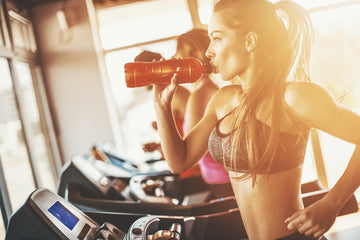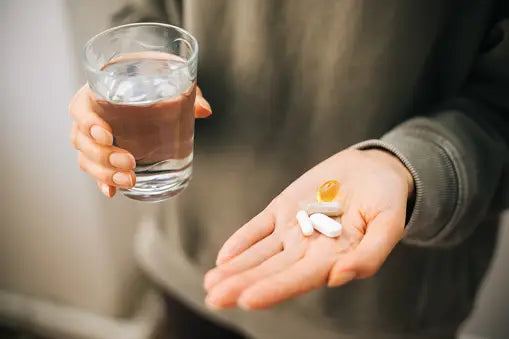

Does Caffeine Improve Gym Performance?
Table of Contents
Caffeine has been prescribed as an effective ergogenic aid for increasing performance in several sports. From events with greater involvement of muscle strength and power to sports that depend on aerobic endurance. It is a stimulant of the central nervous system and its pre-workout intake is related to a lower perceived exertion/fatigue.
Caffeine seems to work especially well for improving performance in the gym. For example, 13 resistance-trained men were given caffeine in a 179 mg energy drink or placebo solution 60 minutes before completing about of the following exercises: bench press, deadlift, prone row, and back squat exercise to failure at an intensity of 60% 1-repetition maximum. Subjects who were given caffeine in their beverage performed more repetitions to failure in all exercises. Another study had 15 women consume caffeine (6 mg/kg) or placebo (PL) seven days apart. Sixty minutes following supplementation, participants performed a one-repetition maximum (1RM) barbell bench press test and repetitions to failure at 60% of 1RM. They discovered that 1-RM strength was greater during the caffeine condition in these resistance-trained women.
Several studies revealed an effect of caffeine on maximal strength. For instance, studies that have tested percent muscle activation and maximal muscle strength of the knee extensors under isometric conditions have shown that caffeine is capable of increasing voluntary activation and strength. A 2014 study reported that the substance can increase not only concentric (i.e. lifting the weight) and eccentric (i.e. lowering the weight) maximal strength, indicating that caffeine increased maximal strength regardless of the contraction mode.
There are many studies have documented that the placebo effect is a powerful stimulator of performance. Researchers examined the placebo effect and the combined effect of caffeine and caffeine expectancy on maximal voluntary strength. Fourteen men completed four randomized, single-blind experimental trials:
1) Told caffeine, given caffeine (5mg.kg);
2) Told caffeine, given placebo;
3) Told placebo, given placebo;
4) Told placebo, given caffeine.
Maximal voluntary concentric force and fatigue resistance of the knee flexors and extensors was measured using isokinetic dynamometry. So we have an interesting study which compared the direct effects of caffeine vs. the placebo effect. At the end of the study, a significant and equal improvement in peak concentric force was found in the told caffeine, given caffeine subjects and told placebo, given caffeine trials. Despite participants believing caffeine would evoke a performance benefit, there was no effect of told caffeine, given placebo. Caffeine caused an improvement in some aspects of muscle strength; however there was no additional effect of expectancy. The performance was poorer in participants who believed the substance would have the largest benefit, which highlights a link between expected ergogenicity, motivation, and personality characteristics.
So for all you caffeine addicts, keeps on drinking your coffee and pre-workout drinks, it ain’t just all in your head like some supplements.
Does Caffeine Cause Muscle Damage?
Caffeine ingestion has been shown to be an effective ergogenic aid in several sports. It may also increase exercise capacity, which could lead to a greater degree of muscle damage after exercise. Researchers examined the effect of caffeine on muscle damage. In a randomized, double-blind, placebo-controlled crossover study. Six male athletes ingested placebo or caffeine (6 mg.kg body mass) capsules on two different occasions. 60 min after the ingestion the capsules was to evaluate serum caffeine levels. After that, all participants performed a protocol of vertical jumps to examine explosive power. The protocol consisted of four sets of 30 sec of continuous vertical jumps with 60 sec of recovery between sets. Blood lactate (LAC) and creatine kinase (CK), a marker of muscle damage, was measured before and after the protocol.
At the end of the study, those given caffeine elicited a 5.23% improvement in the leg power compared to placebo. There was no elevation of muscle damage found after the substance was administered. These results indicate that acute ingestion of caffeine (6 mg.kg body weight) can reduce the level of muscle fatigue and preserved leg power during the test, with no increase in muscle damage, leading to believe that acute administration of (6 mg.kg body weight) caffeine is safe. Thus, caffeine can help athletes in supporting a greater physiological overload during high-intensity training sessions.
Ribeiro BG, Morales AP, Sampaio-Jorge F, Barth T, de Oliveira MB, Coelho GM, Leite TC. Caffeine attenuates decreases in leg power without increased muscle damage Caffeine, Leg Power and Muscle Damage. J Strength Cond Res. 2016 Jan 20.
Tallis J, Muhammad B, Islam M, Duncan MJ. Placebo effects of caffeine on maximal voluntary concentric force of the knee flexors & extensors. Muscle Nerve. 2016 Jan 28. doi: 10.1002/mus.25060.
Kalmar, J. M. & Cafarelli, E. Central excitability does not limit postfatigue voluntary activation of quadriceps femoris. J. Appl. Physiol. 100, 1757–1764 (2006).
Goldstein, E., Jacobs, P. L., Whitehurst, M., Penhollow, T. & Antonio, J. Caffeine enhances upper body strength in resistance-trained women. J. Int. Soc. Sports. Nutr. 7, 18 (2010).
Kalmar, J. M. & Cafarelli, E. Effects of caffeine on neuromuscular function. J. Appl. Physiol. 87, 801–808 (1999).
Park, N. D. et al. Caffeines enhancement of maximal voluntary strength and activation in uninjured but not injured muscle. Int. J. Sport. Nutr. Exerc. Metab. 18, 639–652 (2008).
Duncan MJ, Smith M, Cook K, James RS. The acute effect of a caffeine-containing energy drink on mood state, readiness to invest effort, and resistance exercise to failure. Journal of strength and conditioning research / National Strength & Conditioning Association 2012;26:2858-65.
Goldstein E, Jacobs PL, Whitehurst M, Penhollow T, Antonio J. Caffeine enhances upper body strength in resistance-trained women. Journal of the International Society of Sports Nutrition 2010;7:18.
Ryan EJ, Kim CH, Fickes EJ, et al. Caffeine Gum and Cycling Performance: A Timing Study. Journal of strength and conditioning research / National Strength & Conditioning Association2012.
Wedick NM, Mantzoros CS, Ding EL, et al. The effects of caffeinated and decaffeinated coffee on sex hormone-binding globulin and endogenous sex hormone levels: a randomized controlled trial. Nutrition journal 2012;11:86.
Maughan RJ, Griffin J. Caffeine ingestion and fluid balance: a review. Journal of human nutrition and dietetics : the official journal of the British Dietetic Association 2003;16:411-20.
Zhang Y, Coca A, Casa DJ, Antonio J, Green JM, Bishop PA. Caffeine and diuresis during rest and exercise: A meta-analysis. Journal of science and medicine in sport / Sports Medicine Australia 2014.
Astorino TA, Cottrell T, Lozano AT, Aburto-Pratt K, Duhon J. Increases in cycling performance in response to caffeine ingestion are repeatable. Nutr Res 2012;32:78-84.
Beaven CM, Hopkins WG, Hansen KT, Wood MR, Cronin JB, Lowe TE. Dose effect of caffeine on testosterone and cortisol responses to resistance exercise. Int J Sport Nutr Exerc Metab. 2008 Apr;18(2):131-41.
Hoffman JR, Kang J, Ratamess NA, Hoffman MW, Tranchina CP, Faigenbaum AD. Examination of a pre-exercise, high energy supplement on exercise performance. Journal of the International Society of Sports Nutrition 2009;6:2.

















